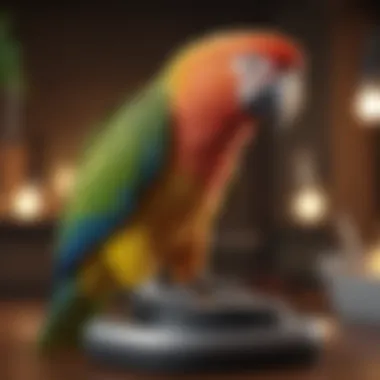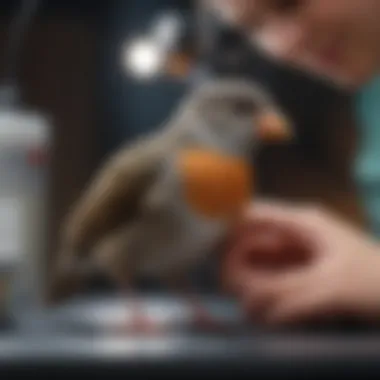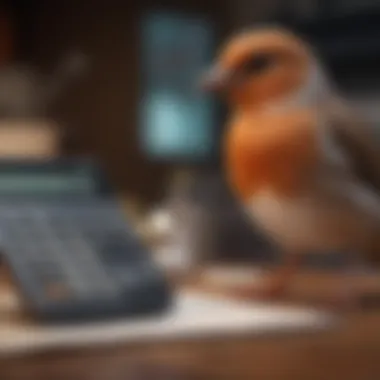Understanding the Costs of Veterinary Care for Birds


Intro
Caring for pet birds involves significant responsibilities and understanding the associated veterinary costs is a core part of that. Pet bird owners often face a range of expenses, which can vary considerably based on various factors. This article aims to elucidate what the outlays entail and their implications on proper avian care. It is not just about understanding current veterinary positioning but also the implication of these costs on the long-term health and tyounnesll well-being of these feathered companions.
Vet costs encompass veterinary consultations, routine check-ups, unexpected emergencies, and specialized treatments that cater to the changing needs of your bird. The complexities of avian health and their unique characteristics not only mandate specialized care but also impact overall expenditure.
By dissecting the costs, you can empower yourself first as a conscious owner and subsequently provide the best possible environment for your pet.
Care Tips
Establishing effective care routines lays the groundwork for avian health. This includes delivering appropriate nutrition, regular health check-ups, and understanding conditional defaults like appropriate cage setups.
Daily Care Routines
Daily interactions will not only build trust but are also opportunities to assess overall behavior and health. Tasks as simple as observing feeding habits, waste production, and plumage condition can yield critical insights into health. Set routines for feeding and play as constant, observant habits provide real-time feedback.
Cage Setup and Maintenance
The environment is crucial. A properly designed cage fosters a comfortable living space. Major considerations include adequate space, diverse perch options, and access to toys and foraging materials for enrichment.
Hygiene and Cleaning Practices
Routine cleaning practices involve removing perches, food bowls, and toys. They must be safely sanitized to eliminate germs and any potential parasites. General cleaning protocols uphold high standards of hygiene and mitigate health risks for your bird.
Seasonal Care Adjustments
Seasonal changes can influence your bird’s well-being. During winter, ensure the environment is warm enough. In summer, it is imperative to have proper ventilation to prevent heat stress. Every season brings additional cues requiring responsive care adjustments.
Behavioral Insights
Understanding avian behavioral patterns can demystify common issues and enhance the relationship between the owner and the bird.
Understanding Bird Body Language
Birds use body language to communicate needs and feelings. Subtle cues like feather positioning, wing movement, and chirping patterns offer indications of contentment or distress. Observing these signs is essential.
Common Behavioral Issues and Solutions
Birds may exhibit behaviors triggered by stress, boredom, or discomfort. Rectifying these situations can often involve changing their environment or routines and introducing diverse activities.
Positive Reinforcement Techniques
Behavior modification can effectively occur through positive reinforcement, rewarding the bird for preferred behaviors to encourage repetition and trust-building.
Social Interaction Needs
Some species require more social interaction than others. It is essential to understand these needs to prevent behavioral problems, emphasizing engagement as a critical aspect of their well-being.
Nutrition Guides
A well-balanced diet underpins the foundation of avian health.
Essential Diet Components
Fruits, vegetables, and high-quality pellets should form a staple diet for most birds. Always ensure that the components are appropriate for the specific species under your care.
Safe and Toxic Foods
Educating yourself on safe foods is vital, just as it is to be aware of toxic counterparts. Foods such as chocolate, avocado, and certain nuts can pose grave threats; knowledge prevents potential poisoning.
Supplements and Treats
Consulting a veterinarian to understand supplements ensures that your bird receives all necessary nutrients tailored to its health condition or life stage.
Feeding Strategies for Different Species
Feeding needs and strategies will differ widely across species. Understanding these nuances aids in sustaining health effectively.


Wellness and Health
Routine health observation and action plans will foresee any mishaps or major health crisises.
Routine Health Checkups
At least once a year, visit an avian vet. These examinations are illustrated crucial in discovering health issues before they become serious.
Identifying Symptoms of Illness
It is imperative to detect symptoms early. Changes in feeding habits, vocalizations, or droppings can indicate underlying conditions that warrant medical attention.
Preventative Care and Vaccinations
Vaccinations and preventative approaches often significantly lower long-term costs associated with critical health issues. Holding up-to-date has great value in safeguarding your bird's life.
Mental and Emotional Well-being
Healthy emotional states can contribute significantly to physical health. Aim to keep your bird stimulated and engaged through various playful activities and social interactivity.
Enriching Activities
Maintaining stimulation through engaging activities will elevate the daily experience for your bird.
Toys and Playtime Ideas
Toys can greatly enhance mental engagement. Rotate toys regularly to keep entertaining aspects fresh.
Training and Tricks
Redirecting energy through tricks or commands fosters cohesion and also builds strength and teamwork.
Outdoor Activities and Interaction
Supervised outdoor experiences bolster various learning opportunities and sensory stimulation critical for stimulation.
DIY Projects for Mental Stimulation
Crafting toys converges budget-friendliness with behavioral science. Engaging DIY stations for toys encourage creativity and mental sharpness.
The onus to incorporate enrichment in organization and placement boils down to you, aiding cognitive and emotional health imperatively for your pet.
Foreword to Avian Veterinary Care
Understanding avian veterinary care encompasses crucial factors that pet bird owners must consider. It is vital for the well-being and health of birds to receive proper medical attention, making awareness of veterinary costs essential. Owners should recognize that birds have unique physiological and behavioral needs that differ greatly from other pets like dogs and cats. This difference necessitates specialized care often found only at facilities experienced with avian species.
In today’s world, more individuals are opting for birds as companions. As interest in bird ownership rises, so does the need for informed decisions regarding their veterinary care. This guide seeks to unwrap the complexities surrounding the costs associated with avian health care, enabling bird owners, aspiring bird parents, or breeders to plan ahead effectively. It is not just about knowing costs but understanding what they represent. Many factors influencing these expenses offer insights into the relationship between the type of care birds receive and the amenities available for their species.
Importance of Veterinary Care for Birds
Veterinary care is not merely a choice, but a necessity for maintaining the health of birds. These animals are not like other pets; they often hide obvious signs of illness until the condition becomes quite serious. Owners can ensure early diagnosis and treatment of avian illnesses through regular veterinary check-ups and proper preventive care. This can result in a prolonged and healthier life for their birds.
Regular check-ups help monitor the health status of birds. Diseases can quickly escalate in severity without timely interventions. Thus, having access to a knowledgeable vet with avian expertise can make all the difference.
Key Elements of Veterinary Care for Birds:
- Understanding species-specific health risks
- Regular vaccinations for preventable diseases
- Behavioral assessments to spot potential issues early
The financial commitment to avian health care is significant, but the benefits — both financial in avoiding long-term medical confusions, and existential through the quality of life provided to the birds — justify the investments for health and happiness of these companions. The decision regarding veterinary care should center around ensuring that birds receive appropriate, timely, and expert advice, thus safeguarding their overall well-being.
Common Misconceptions About Bird Veterinary Costs
Many pet owners harbor myths about veterinary costs specifically for birds. One common misconception is that avian veterinary care is significantly more expensive than that for more traditional pets. While it may feel pricier, this viewpoint can lead to misunderstanding the needs of pet birds. Other misconceptions often include that regular care is not necessary and that birds can get by without specialized support.
In fact, avian veterinary services may include unique considerations in care, addressing things like specialized diets or preventive care targeted at particular chains of illness prevalent in birds. It is essential to understand what drives costs in avian care, including:
- Geographic location and local market trends
- The complexity of care based on species and health needs
- Availability and qualifications of local avian specialists.
Common downsides that owners overlook include postponing essential check-ups for financial reasons, which can lead to larger health costs. Never understate the overall control versus expenditures balance regarding avian care. A proactive approach often leads to lower long-term costs and a healthier bird.


Understanding these misconceptions allows bird owners to engage responsibly with veterinary services, promoting a healthier environment both emotionally and financially.
Factors Influencing Veterinary Costs for Birds
Veterinary care for birds encompasses various aspects that contribute to the overall cost. Understanding these factors is essential for bird owners, aspiring pet parents, and breeders alike. There are multiple elements at play. Each can affect the financial commitment needed for effective avian care. Recognizing how these aspects interact can lead to more informed decisions about pet health.
Species-Specific Care Requirements
The species of bird often defines care needs. Each kind of bird has unique medical requirements due to differences in physiology, behavior, and diet. For instance, exotic species like macaws may require specialized diets and housing that increases their veterinary expense. Proper preventive care is also vital for specific species. For example, certain birds may need more frequent health screenings or vaccinations. Understanding the specific care your bird needs is crucial in anticipating potential costs.
Location and Regional Pricing Variations
Pricing can vary by region and even within cities. Factors such as cost of living, demand for veterinary services, and availability of clinics directly influence expenses. Urban areas typically show higher costs than rural settings. This means potential owners should check local vet offices in their regions. Compare prices between different providers to understand where to obtain the best value.
Veterinary Clinic Type and Expertise
The level of expertise and type of veterinary clinic also play key roles in determining costs. Specialized clinics focusing exclusively on avian species often charge more than generalist practices for several reasons. Experienced vets who know bird health well provide better diagnostic and treatment services. Clinics that offer advanced technologies for diagnosis, such as ultrasound or radiography, can also marginally increase charges. Bird owners should consider the overall skills of veterinary teams and clinic reputations when deciding on care providers.
Higher veterinarian fees sometimes reflect the value of experience and specialized knowledge lavished on our avian companions.
Types of Veterinary Services for Birds
When it comes to bird health care, understanding the various types of veterinary services that are available is crucial. Each type of service caters to different needs and scenarios. This section discusses the fundamental services that pet birds might require.
Routine Check-ups and Preventive Care
Routine check-ups and preventive care are crucial for long-term avian wellness. Such practices can detect health issues before they escalate and ensure that the bird is thriving. Early detection can often lead to more effective treatment.
Most bird owners know that regular vet visits offer vaccination updates and health checks. These sessions may include an evaluation of the bird's diet, plumage, and even behavior. Additionally, routine care can encompass blood tests or fecal exams to check for parasites, which can go unnoticed without professional help.
On average, these preventive visits cost between $50 and $150. The expense might feel considerable, but understanding its importance can help solidify the value of this investment in your bird's health. Regular screenings not only aid in the identification of potential health issues, they promote longevity and overall wellbeing.
Emergency Services and Specialized Treatments
Emergency veterinary services are indispensable, often demanded unexpectedly during crises. Birds can experience sudden illnesses or injuries that require swift intervention. Not all practices are equipped to offer emergency services, so knowing which clinics can handle urgent care is critical.
Costs associated with emergency visits vary widely based on location and problem severity. On average, an emergency visit may start at $150 but can surpass $500 for extensive treatment. Some regions may have specialized avian clinics that provide services ranging from critical care to specialty consults for rare diseases. This segment enables bird owners to understand the potential expenses linked with emergencies, solidifying the need for being prepared for unforeseen incidents.
Surgical Procedures and Recovery Costs
Surgical assistance for birds is not as commonly understood but is a vital aspect of veterinary care. Whether it's for an injured wing, removing a tumor, or fixing a reproductive issue, various surgical options exist.
Before any surgical procedure, owners should inquire about pre-operative care and post-operative requirements. These can include medication prescriptions and careful monitoring during recovery. Surgical procedures costs tend to fluctuate based on the complexity of the operation and can range from $300 to over $1,000. Adding recovery costs, such as veterinary follow-ups and special diets, must be factored into the overall financial picture.
Understanding these variables helps pet owners prepare for both immediate surgical needs and the associated costs of aftercare for their birds actually succeeding in surgery.
Behavioral Consultations and Therapy
Birds, like other pets, can encounter behavioral issues. Problems may include excessive screaming, biting, or feather plucking. These can arise from several causes, including lack of stimulation, stress, or underlying health conditions.
Behavioral consultations with trained avian professionals help to identify these triggers and craft a suitable management plan. Sessions often involve assessments of the bird's environment, diet, and socialization habits. A behavioral evaluation costs less than standard vet appointments, typically ranging from $75 to $150, but can produce significant improvements in a bird’s quality of life.
For many bird owners, fostering positive behaviors not only enriches their pet's life but can also prevent severe issues—saving costly healthcare and stress.
It’s essential to listen to your bird’s needs, as underlying behavioral issues often reflect bigger health concerns.
By grasping these diverse types of veterinary services, bird owners can navigate the landscape of avian care more proficiently. The ability to anticipate and plan for these costs is a privilege of having well-informed pet caregivers.
Estimating the Cost of Routine Veterinary Visits
Estimating the cost of routine veterinary visits is an essential aspect of responsible pet ownership, especially for bird owners. Regular vet check-ups ensure that your feathered companions remain healthy and receive preventive care. Understanding these costs can help owners budget effectively, making sure they can provide adequate medical attention when needed.
Routine visits not only cover initial exams but also involve vaccinations and other preventive services. By affording these regular exams, bird owners are more likely to detect potential health issues early, which can save on more expensive emergency treatments later. Therefore, getting a sense of average costs makes it easier for owners to anticipate their financial obligations related to avian healthcare.
Average Cost of Initial Examinations
The average cost of initial examinations for birds typically ranges between $50 and $75. Factors such as the bird's species, age, and health history affect this price. Clinics may charge more if specialized equipment is necessary. It's also essential to note the qualification level of the veterinarian. An experienced avian vet may cost more, but their knowledge for birds, like parrots or finches, is invaluable. For first-time bird owners, this examination often provides vital information on the pet's specific care needs and issues that may not be outwardly visible.


Costs Associated with Vaccinations and Testing
Vaccinations are crucial for preventing avian diseases. Costs vary depending on the type of vaccination and geographical location. Generally, bird vaccinations may cost between $15 and $30 per shot. Testing is another important aspect of routine care. Blood tests or test for specific ailments might range from $25 to $200, strongly depending on the complexity of the tests required. Regular testing and vaccinations are part of a proactive healthcare approach that aims at ensuring long-term well-being for birds.
Annual Wellness Plans and Memberships
Many veterinary clinics now offer annual wellness plans and memberships aimed at making regular care more accessible. Usually, these plans bundle essential services like check-ups, vaccinations, and testings at a lower overall cost. On average, these plans can range from $200 to $500 annually. Each plan offers benefits tailored to the individual needs of bird owners. Such budgeting can lead to substantial savings for bird owners when optimal care is both applied and budgeted wisely from the outset.
Potential Unexpected Costs in Avian Health Care
The management of a pet bird's health includes the ability to anticipate and prepare for unexpected costs. While many owners estimate their regular veterinary expenses based on standard check-ups and vaccinations, the reality is more complex. Birds may encounter unforeseen health issues, which can significantly increase caregiving costs. Understanding these potential expenses is crucial for bird owners, enabling them to project finances realistically and promote their feathered friends’ 'long-term wellness.
Emergency Situations and Unforeseen Expenses
Emergency situations can arise without warning. For instance, a bird might suddenly become sick or sustain an injury, such as a broken bone after a fall. Such incidents can lead to immediate vet visits, often outside normal operating hours, which contributes to the urgency and added expense of care.
- Common Examples of Emergencies:
- Trauma from falls or collisions.
- Accidental poison ingestion.
- Respiratory distress due to various factors.
Veterinary clinics may implement emergency fees that significantly heighten your financial obligations during urgent situations.
Moreover, diagnostic tests are often necessary. These tests check blood, x-rays, and even specialized evaluations, depending on symptoms. Resulting costs can accumulate quickly. Some clinics may charge slightly less for exams but higher for treatments or hospitalization, adding further complexity to navigating emergent care. The average results for emergency vet charges can range from $100 to over $1,000, depending on the severity and required interventions. Thus, pet owners should assiduously consider robust funding for unexpected vet visits.
"Providing a financial buffer for emergency health care protects the overall well-being of your pet bird, fostering long-lasting peace of mind."
Chronic Illness Management and Long-term Care
Chronic illnesses in birds may develop over time, often subtle enough that their symptoms are not immediately recognized. Conditions such as diabetes, avian cancers, or behavioral challenges demand prolonged attention and care. Unfortunately, the management of chronic illnesses typically incurs ongoing expenses, extending your financial commitment beyond typical care.
Consider the associated costs:
- Regular Vet Visits: Frequent check-ups might be essential, at an often recurring cost that could be comparable to emergency fees.
- Medication: Long-term treatment needs for some illnesses often involve purchasing medications. These can add to prospective costs, ranging from a few dollars to hundreds each month.
- Specialized Diets: Birds may require tailored nutrition, which not only complicates meal planning but can also be pricier than typical bird food on the market.
due to careful, thoughtful planning, owners can mitigate the weight of these potential costs. Researching insurance options specific to avian health can provide extra layers of communal safeguard against unforeseen circumstances. Specifically, consider policies that address unexpected veterinary care necessity, ensuring a smoother experience for both the bird and owner. Moreover, establishing a detailed budget focusing on both immediate needs and searching costs for chronic care is pivotal. The cultivation of this awareness lays down the foundation for returning the love and care that birds bestow upon their human counterparts.
Budgeting for Bird Health Care
Budgeting for avian health care is crucial for all bird owners. Unlike other pets, birds may require specialized veterinary services. This edition seeks to empower owners to anticipate costs for routine care and emergency situations. A clear budget not only highlights financial commitments but also enhances a bird's well-being. Additionally, understanding and allocating resources can alleviate the stress linked with unexpected expenses.
Creating a Comprehensive Health Care Budget
A health care budget for your bird should consider various components. First, outline your bird's species, as care costs can differ widely. For example, a cockatoo may need more frequent checks than a zebra finch. Next, designate a monthly amount dedicated to proactive health measures. Preventive care, such as vitamin supplements and nutritious food, falls under this category. Also, remember to add unforeseen costs.
Consider this framework:
- Routine veterinary visits: Allocate funds for regular check-ups.
- Emergencies: Set aside a specific amount for urgent care, which can be unpredictable.
- Medications and treatments: Account for any additional costs linked with chronic issues or post-operative care.
Engaging in proactive budgeting not only aids in financial planning. It also ensures that essential health care services are always accessible. A detailed budget enables owners to find the right veterinary resources, ensuring that any health care assessment aligns well with the available finances.
Insurance Options for Pet Birds
Considering insurance is smart for any bird owner. Pet insurance comes with a variety of options that cater to avian health. Normally, policies include specific stipulations around what conditions are covered. Some groups may focus on emergencies, while others include ongoing issues. It is vital to select a plan that provides clear coverage for avian needs, encompassing both wellness visits and unforeseen treatments.
Factors to consider when selecting an insurance plan include:
- Premium costs: Balance monthly payments against coverage.
- Deductibles: Understand the out-of-pocket amount required before insurance kicks in.
- Coverage limits: Analyze any annual restrictions on claims.
Research different providers extensively. Websites like Reddit feature discussions on various pet insurance reviews, offering insights from other bird owners. Be diligent in comparing various policies to ensure that you choose an optimal plan, fitting the unique requirements of your feathered friend.
The End
In assessing the costs associated with veterinary care for birds, it is imperative to recognize the multifaceted nature of these expenses. The well-being of avian companions sustains without compromise, yet it necessitates an informed approach to financial planning.
Summary of Key Financial Considerations
Numerous factors can dictate the overall investment needed for the health care of birds. Each pet bird owner must contemplate these factors vigilantly. Significant considerations include:
- Species-Specific Needs: Different avian species have varied requirements that directly influence costs.
- Geographical Differences: Veterinary services can fluctuate greatly based on regional pricing, influencing familiarity with veterinary services nearby.
- Routine vs Emergency Care: Routine visits tend to cost less compared to unexpected emergency situations, making it pivotal to anticipate possible medical needs.
By taking steps to understand and prepare for these aspects, bird owners can avoid financial strain.
The Value of Quality Veterinary Care for Birds
Quality veterinary care is invaluable for pet birds. A proactive approach towards veterinary visits often leads to early detection of potential health issues. This not only ensures immediate well-being of the pet but also reduces costs in the long run. Additionally, professionals with ambiguity for species specialization are better equipped to understand the intricacies of avian medicine. While premium services may require a higher fee, the potential cost of neglecting quality care can far exceed those initial expenses.















